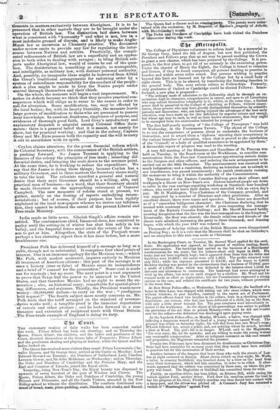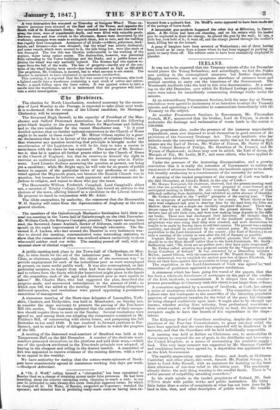ITO _Petropolis.
The College of Physicians volunteers to reform itself. In a memorial to Sir George Grey, dated the 8th of August, but now first published, the President and Fellows pray that an act may be passed enabling the Crown to grant a new charter., which has been prepared by the College. It is pro- posed, in the first place, to get rid of an anomaly in the examining power. Under the charter of Henry the Eighth, the College is bound to examine and license, if they be found competent, all persons desiring to practise in London and within seven miles round. But persons wishing to practise beyond this limit are licensed not by the College but by a small body of eight elects. This is to be altered, by transfering the licensing function to the general body. The next reform relates to Fellowships. Formerly, only graduates of Oxford or Cambridge could be elected Fellows: hence- forward, a new plan is proposed-
" The ordinary. mode of admission to the Fellowship shall be through an ex- amination, high in character, comprehensive in extent, and open to all Licentiates
who may submit themselves voluntarily to it; whilst, at the same time, a limited
power shall be preserved to the College of admitting. as Fellows, without exami- nation, those persons who may have greatly distinguished themselves by scientific
pursuits and discoveries; who, not having enjoyed the advantage of the best early education, may have made up for this deficiency by superior talents and enew, but whose age may be such, as well as their known attainments, that they ought to be exempted from the examination intended for younger men" The first half-yearly meeting of " the College of Preceptors " was held on Wednesday, at the Freemasons Tavern. " The object of the College
is, to test the competence of persons about to undertake the business of instruction, and to award them a `diploma' attesting their competency in the various branches of education, when that is proved to the satisfaction of the Connell,' or a body of qualified examiners to be appointed by them," A favourable report of progress was read to the meeting.
A very full meeting of the Directors and Guardians of St. Pancras was held on Tuesday, in the Board-room at the Workhouse, to consider corn munications from the Poor-law Commissioners apportioning certain duties to the Surgeon and other officers, and ordering the new arrangement to be
carried out on the 30th December. The announcement was received with much indignation; and a resolution, declaring an intention not to submit to any interference, was passed unanimously; the parish obstinately resisting the endeavour to bring it within the authority of the Commissioners.
The Directors of the Eastern Counties Railway gave their officers and workpeople a dinner on New-Year's eve. Sixteen hundred people eat down to table in the vast carriage-repairing workshop at Stratford: four hundred others, who could not leave their duties, were oonsoled with an extra day's pay. Mr. D. Waddington, Vice-Chairman of the Company, presided, and was supported by a number of Directors and other gentlemen. After an excellent dinner, there were toasts and speeches. The latter are described as of a " somewhat belligerent character; the Chairman declaring that he
treated with contempt the opinions of the press respecting the manage- ment of the Eastern Counties Railway; and Mr. Sheriff Kennard boldly avowing hisopinion that the line was the best-managed one in tbe kingdom. Eventually, the floor was cleared; the female relatives and friends of the diners were admitted, increasing the party to three thousatiti and dancing began, with which the year 1847 was ushered in.
Thousands of holyday visitors of the British Museum were disappointed on Boxing Day; as it is a rule that the Museum shall be shut on Saturdays, and no exception to this rule was made at Christmas.
In the Bankruptcy Court, on Tuesday, Mr. Samuel Ward applied for his certi- ficate. His application was opposed, on the ground of reckless trading, fraud, and extravagance. The bankrupt bad carried on the business of a Manchester warehouseman for ten years; but his balance-sheet only began in 1842. His books bad not been regularly kept; but it appeared from them that his debts and liabilities were 10,8801.; the assets were only 1,4851. The profits returned were only 9211.; while the expenses amounted to 2,6141., and the losses to 6,8561. Reckless trading was proved by the circumstance that a business of 77,8041. gave a profit of 1,91W.; from which was deducted in the balance-sheet 1,5501. for discount and allowances to customers. The bankrupt had never attempted to wind up his affairs, but went on until stopped by a creditor. Mr. Ward and his counsel made an effort at explanation; but the Commissioner expressed a strong opinion on the ease, and refused the certificate for two years, without protection in the mean time.
At Bow Street Police-office, on Wednesday, Timothy Mahony, the landlord of a house in Shire Lane, was charged with letting out two stone cellars, which were without windows, to poor families, contrary to the recent act of Parliament. The parish-officers found two families in the cellars, both in a shocking state of destitution: one woman, who had just been delivered of a child, lay on the floor, with only a little straw beneath her. The poor creatures were immediately re moved to the workhouse. As the object of the proceedings was rather to publish the provisions of the act than to punish Mahony—who said he did not receive rent for the cellars—the defendant was discharged upon paying costs.
At the Lambeth Police-office, on Monday, M'Leish, a baker, was charged with inflicting a dangerous wound on the head of ayoung woman named Wood. The prisoner was drunk on Saturday night; his wife fled from him into Wood's room; M'Leish followed her, seized a poker, and, not noticing whom he struck, levelled a blow at Wood. The girl's life is in danger. M`Leish said to the Magistrate, "I'm very sorry, Sir, for the mistake; and am willing to make the young woman any reasonable compensation." After an indignant comment on this cool remark and proposition, the Magistrate remanded the prisoner.
Twenty-two Policemen have been dismissed for drunkenness on Christmas Day. Some had been constables for so many years that they would have been entitled to pensions but for this termination of their service.
Another instance of the dangers that beset those who walk the streets of Lon- don at night occurred on Sunday. About eleven o'clock on that night, Mr. Wade, a tailor, in crossing Smithfield, was knocked down by a blow on the head from some blunt instrument, which laid him senseless, in order to be rifled. It after- wards appeared that the robbery was committed by three men, on whom the pro- perty was found. The Magistrate at Guildhall has committed them for triaL Freddy, an omnibus-driver, has been killed, on Brixton Hill, while racing his vehicle against Ford, another driver. Ford drew his omnibus across the road to bar the progress of his rival; Freddy's omnibus was thus forced into contact with a lamp-post, and the driver' was pitched off. A Coroner's Jury has returned a verdict of " Manslaughter" against Ford.
A very destructive fire occurred en Thursday at Irongate Wharf. Those ex- tensive premises were situated at the East end of the Tower, and opposite the South wall of St. Katherine's Docks; they extended more than two hundred feet along the river, were of considerable depth, and were filled with valuable goods. Between three and four o'clock in the afternoon, flames were discovered by the workmen; attempts were made to extinguish them, but in vain, and the building was rapidly fired throughout. Assistance of all kinds—soldiers, policemen, dock- bands, and firemen—was soon obtained; bat the wharf was utterly destroyed; and some vessels which were moored to it, the tide being low, were also more or less damaged. The low tide was likewise unfavourable to the working of the engines, water being rather scarce. The destruction, however, was prevented from extending to the Tower buildings and the Docks, and a public-house ad- joining the wharf was only partially injured. The firemen had two narrow es- capes from the fall of the walls. The loss of property—hardly any of the con- tents of the wharf having been saved—has been estimated as high as 200,0001. The proprietor, Mr. Coleman, is insured, but to what amount is not stated. The disaster is surmised to have originated in spontaneous combustion. This morning, it is reported that the fire was caused by a workman, who took alighted candle into a warehouse containing a vast stock of cotton and cotton- waste: a spark falling upon the loose cotton. It was against orders to take a candle into the warehouses; and it is understood that the proprietor will insti- tute a strict investigation.































 Previous page
Previous page